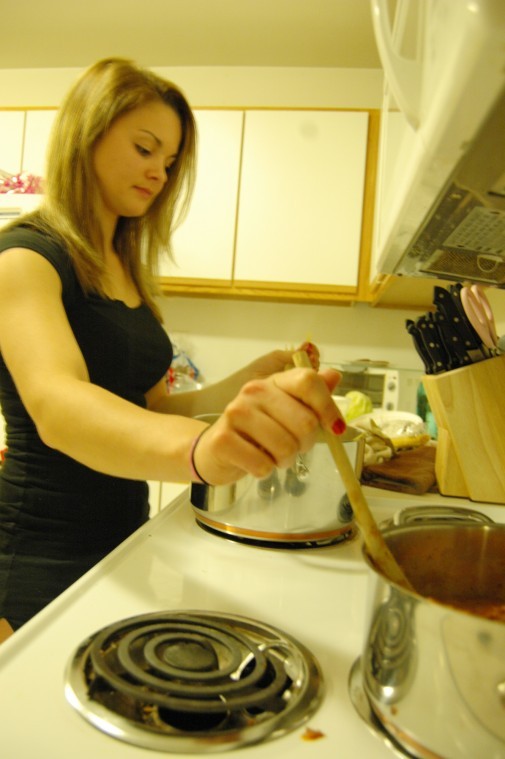Tips for cooking safely
Laybe Bennett, junior special education majo, cooks spaghetti for her and her roommates Tuesday night.
September 21, 2011
In the college life cooking for oneself is a way to save money and maintain a healthier lifestyle, but it can also be recipe for a structure fire.
“(Cooking fires) are the biggest cause of accidental fires,” said DeKalb Fire Chief Bruce Harrison.
Cooking with little knowledge or care can be the cause for most kitchen fires along with using unsafe and untested equipment to prepare food, Harrison said.
September is Campus Fire Safety Awareness Month, created by the Office of Governor Pat Quinn and the Office of the Illinois State Fire Marshal. It was created to put forth an effort to educate college students on fire safety while living off campus, stated a press release by the Office of the State Fire Marshall.
Cooking fires are the leading cause of structure fires in the U.S, stated the release. A research conducted by the National Fire Data Center reported that unattended cooking is the leading cause of these fires. The main materials that cause cooking fires are oils, fats, and grease.
A report by the DeKalb Fire Department stated 45 percent of cooking fires were contained while five percent of cooking fires were beyond the origin of the fire, or extends outside of the stove, oven, or where the cooking is being done.
Harrison said there has been an increase in fires exceeding their point of origin.
“The cooking fires are doing more damage than previously before,” Harrison said.
In 2010, approximately five percent of cooking fires were beyond origin of fire. In 2011, through Aug. 18, approximately 14 percent were beyond origin.
Since 2004, one civilian death occurred in 2007 as a result of a cooking fire. There have been no reported firefighter deaths since 2004, only 2 injuries occurred, one in 2008 and one in 2009 as a result of cooking fires, stated the report.
“The solutions are pretty simple,” Harrison said. “Don’t leave your cooking, even for brief periods.”
Although the dorms on campus only allow a school provided microwave and refrigerator, accidents can still occur.
Housing and Dining Executive Director, Michael Stang, recalled an incident when a resident in the dorms was cooking soup in the microwave and it caught fire.
Other cooking equipment is prohibited in the dorms such as toasters, coffee makers, and equipment such as George Foreman grills. It is a fire safety issue for us, Stang said.
Microwave usage in the dorms should be monitored and never left alone.
“Try not to leave things unattended,” Stang said. “It’s important to pay attention.”







